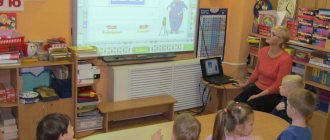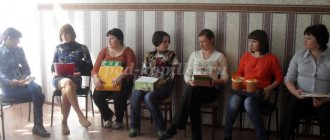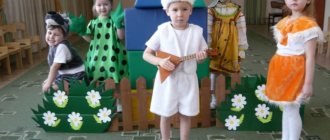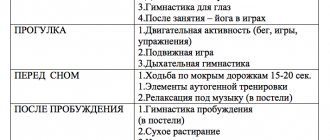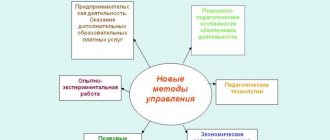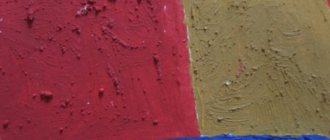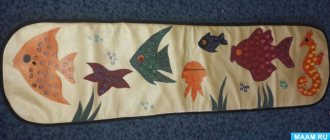“Health-saving technologies in the educational process of preschool educational institutions and the family.”
Monitoring of the health status and physical development of children is carried out by kindergarten medical workers. All work on the physical education of children in preschool educational institutions is based on their physical fitness and existing deviations in health. To do this, based on individual medical records, the preschool doctor draws up a summary diagram for each age group, which helps educators and medical workers have a clear picture of the health status of the children of the entire group and each child individually. This analysis scheme and specific recommendations are entered into the group “Health Log” - “Child’s Individual Route” - so that each teacher plans physical education and health activities in accordance with the children’s health characteristics.
Physical education and health technology
Physical education and health activities are aimed at the physical development and strengthening of the child’s health.
Objectives of this activity:
— development of physical qualities;
— control of motor activity and development of physical culture of preschool children,
— formation of correct posture, prevention of musculoskeletal disorders;
- developing the habit of daily physical activity;
- healing by means of hardening. Physical education and health activities are carried out by a physical education instructor during physical education classes, as well as by teachers - in the form of various gymnastics, physical education sessions, dynamic breaks, etc.
Technologies for ensuring the socio-psychological well-being of a child
The purpose of this activity
– ensuring emotional comfort and positive psychological well-being of the child in the process of communicating with peers and adults in kindergarten and family; ensuring the social and emotional well-being of a preschooler, since the emotional mood, mental well-being, and cheerful mood of children are important for their health. In its activities, the “escort service” is guided by the Regulations on the medical-psychological-pedagogical service and aims to create an integral system in a preschool institution that provides optimal conditions for the development of children, taking into account age and individual characteristics, the state of somatic and mental health. In this system, diagnostic, advisory, correctional and developmental, treatment and preventive and social areas interact.
Technologies for health conservation and health enrichment for teachers
Improving the health of children and their favorable physical development is influenced by the entire way of life of a child in kindergarten, the caring and attentive attitude of adults towards him, and the high sense of responsibility of the entire team for each pupil. Therefore, much attention in our preschool educational institution is paid to the selection and placement of personnel into groups, taking into account their business qualities, experience and psychological compatibility. Bearing in mind that the results of physical development depend primarily on the professional training of teachers and their pedagogical knowledge, a system of comprehensive methodological work to improve skills has been thought out.
folder - moving Healthy family - healthy childmaterial (younger group)
Healthy family - healthy child
The family is the main link where good habits are formed and bad ones are rejected. The child’s first impressions associated with performing a certain action are drawn from home life. The child sees, perceives, tries to imitate, and this action is reinforced in him regardless of his fragile will. Habits, traditions, lifestyles, and attitudes toward one’s health developed over the years in the family are carried over into adulthood. Therefore, it is necessary to value, protect and strengthen health from a very early age in order to demonstrate a healthy lifestyle by personal example.
Every parent wants to see their children healthy and happy, but does not think about how to ensure that their children live in harmony with themselves, with the world around them, with people. The secret of this harmony is simple - a healthy lifestyle:
- Maintaining Physical Health
- No bad habits
- Proper nutrition
- The joyful feeling of one's existence in this world
Nothing can influence a child’s behavior so powerfully as a clear parental example.
No wonder they say: “A child learns what he sees in his home.”
PROVERBS AND SAYINGS ABOUT HEALTH.
- Where there is health, there is beauty.
- The disease will not catch up with the quick and clever.
- If you want to be healthy, toughen up.
- Cleanliness is the key to health.
- He who does not know health is never sick.
- Whoever gets up before daylight is healthy during the day.
- Unreasonable fatigue is a harbinger of illness.
- Money can't buy health.
- God grant us health, but we will find happiness.
- Move more - you'll live longer
- Lying down and sitting makes the illness worse.
- He who does not smoke or drink takes care of his health.
- A sick person doesn’t even taste honey, but a healthy person eats stone.
- Lost money - lost nothing, lost time - lost a lot, lost health - lost everything.
“What should you do to keep your child healthy?”
- Constantly monitor your health and the health of your children.
- Provide nutritious and nutritious food for the family.
- Maintain a daily routine and create conditions for walking on weekends.
- Ensure a healthy, hygienic environment (regularly ventilate the room, do wet cleaning, ensure adequate lighting).
- Teach your child to care for his body: brush his teeth twice a day, rinse his mouth after eating, shower daily, change bed linen.
- Be active in physical education and sports.
- Do not have bad habits, and if you have them, get rid of them, as they have a detrimental effect on the child’s body.
- Children of smoking parents are much more likely to suffer from bronchopulmonary diseases.
- Create a favorable psychological atmosphere in the family. In happy families, the incidence of illness even during periods of epidemics is several times lower.
- Carry out active interaction with the kindergarten on issues of protecting and promoting children’s health.
How to maintain health?
To maintain health,
Strengthen your body, My whole family knows - There must be a daily routine. Guys, you should know - Everyone needs to sleep longer. Well, don’t be lazy in the morning - get ready to exercise! Brush your teeth, wash your face and smile more often, toughen up, and then you won’t be afraid of the blues. Health has enemies, don’t make friends with them! Among them is quiet laziness, you fight it every day. So that not a single microbe accidentally gets into your mouth, wash your hands before eating with soap and water. Eat vegetables and fruits, fish, dairy products - This is healthy food, full of vitamins! Go for a walk and breathe in the fresh air. Just remember when leaving: Dress for the weather! Well, if it already happened: You got sick, Know that it’s time for you to see a doctor. He will always help us! These are the good tips, The secrets are hidden in them, How to maintain health. Learn to appreciate it!
Poem “Skiers” (Lev Kvitko)
Blizzard, Blizzard, Blizzard, Blizzard. Can't see each other at all, Our cheeks are freezing as we run, We'll beat the blizzard! The skis are flashing faster and faster, The goal is getting closer, Closer, Closer, Through the spruce forest, Through the bushes, From the pass, From above. No interference for skiers. Who will get there before everyone else? Along the White Road Boldly, Boldly, Boldly We rush forward. Even if the Turn is dangerous, The paths may be Narrow, The Descents may be very steep, The Ascents may be difficult, We will not give up speed! Up and down Rush like a whirlwind! Spruce, pine, stand aside! Let the Frost rage - Ski cross will take place!
A REMINDER FOR PARENTS ON FORMING A HEALTHY LIFESTYLE IN THEIR CHILDREN.
1. Start a new day with a smile and a morning workout.
2. Follow a daily routine.
3. Remember: a smart book is better than aimless watching TV.
4. Love your child, he is yours. Respect your family members, they are fellow travelers on your journey.
5. You should hug your child at least four times a day, and preferably 8 times.
6. A positive attitude towards yourself is the basis of psychological survival.
7. There are no bad children, only bad actions.
8. Personal example for a healthy lifestyle is better than any morality.
9. Use natural hardening factors - sun, air and water.
10. Remember: simple food is healthier than elaborate dishes.
11. The best type of recreation is a walk with the family in the fresh air, the best entertainment for a child is playing together with parents.
Folder text:
To develop a healthy lifestyle, it is necessary to tell your child about disease prevention and provide basic information about medications and diseases. Once a child has been ill, he will learn to compare the state of a healthy and a sick person. A child should know what health is and what illness is. It is useful to give children the opportunity to exchange experiences, tell each other what they know about diseases, how they felt when they had a sore throat, stomach, or headache. You need to tell your child about the many reasons that lead to illness and how to avoid illness. It can be difficult to convince a child to wash his hands before eating, not to put icicles in his mouth, not to eat snow, not to sit for a long time in front of computer games or in front of the TV, etc. It is difficult for a child to understand the connection between the disease and its causes; teaching him to take care of his body and not harming it is extremely important.
It is useful to introduce the child to the profession of a doctor and talk about how a doctor helps people become healthy.
What to tell your child
“You’ve probably heard adults say: “Doctors are our friends.” Explain this expression.
Tell your child about Dr. Neboleyko. He heals people and knows a lot about diseases. Using a microscope, he studies tiny organisms that are invisible to the human eye - microbes. Using a microscope, you can see many microbes in a drop of dirty water. If you drink this water, you can get sick. Microbes are dangerous because they are found everywhere and, when entering the human body, can cause illness. But, fortunately, our body is able to protect itself from this.
Firstly, our entire body is covered with skin. The skin protects the body from external influences. A lot of germs accumulate on our hands, because we touch objects with them on the street, in places. Where there are a lot of people, we pet our pet animals.
Doctor Nebolyko's rules:
- do not rub your eyes with dirty hands;
- do not put your fingers in your mouth;
- when coming home from the street, wash your hands;
- wash your hands before eating.
Secondly, the human body has a protective mechanism - immunity. But a weak body also has a weak immune system.
To strengthen your immune system, follow Dr. Neboleyko’s rules:
- keep a daily routine;
- maintain hygiene, keep things and your room clean and tidy;
- harden yourself: take air and sun baths, swim in the river, lake, sea in the summer; do gymnastics, etc.
Thirdly, a person himself must take care of his health. Dr. Neboleyko warns: when coughing and sneezing, tiny particles of saliva fly out of a person’s mouth. A person with the flu releases a virus (the source of the disease) through their coughs and sneezes, which is transmitted through the air. That is why, when in contact with a sick person, you need to wear a hygienic mask so as not to become infected.
Hygiene rules:
- Be sure to wash your hands before eating.
- Wash your face and brush your teeth in the morning and evening.
- Keep your body clean, harden yourself.
- Never eat snow or icicles - take care of your throat.
- Don't eat from someone else's plate.
- Don’t finish eating or drinking someone else’s food.
- After handling animals, be sure to wash your hands.
- Keep your things clean.
- If you get sick, don’t be afraid to call a doctor - he will quickly cure you.
- If there is a sick person at home, wear a mask.
- Don't pick anything up from the ground.
Read to your child K. Chukovsky’s fairy tale “Doctor Aibolit.” Play the game “Heal Your Favorite Toy.” Read poems and solve riddles together.
Poems, riddles about health:
- Doctor, doctor, what should we do: Should we wash our ears or not? If you wash, then what should we do: Wash often or less often. The doctor answers: - HEDGEHOG! The doctor answers angrily: “EVERY-EVERY-DAY!” (E. Moshkovskaya)
He will cure measles, and bronchitis, and sore throat, and will prescribe pills and vitamins. (Doctor)
Questions and tasks
—Have you ever had to see a doctor? Tell me about it. Where does the doctor work? What does the doctor look like and what does he wear? How did he examine you and treat you? What medical instruments did you use?
